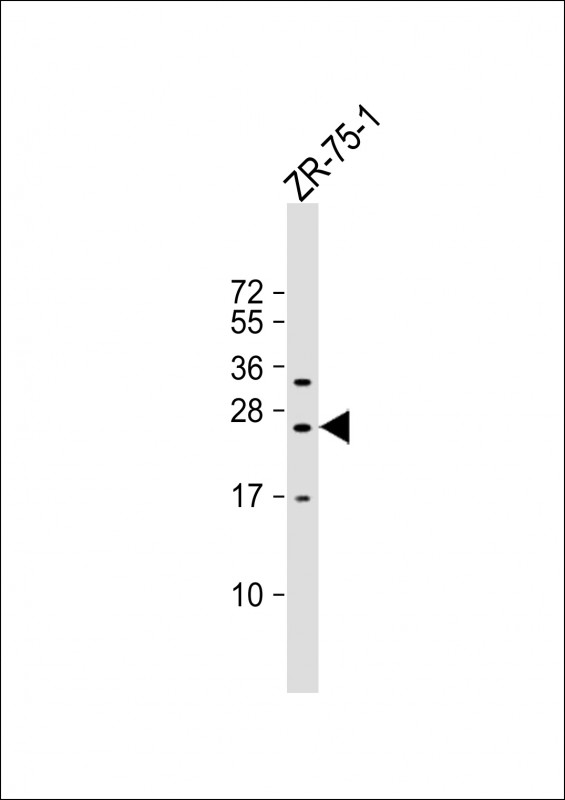

| WB | 1/1000 | Human,Mouse,Rat |
| IF | 咨询技术 | Human,Mouse,Rat |
| IHC | 咨询技术 | Human,Mouse,Rat |
| ICC | 技术咨询 | Human,Mouse,Rat |
| FCM | 咨询技术 | Human,Mouse,Rat |
| Elisa | 咨询技术 | Human,Mouse,Rat |
| Aliases | Killer cell lectin-like receptor subfamily F member 2, Lectin-like receptor F2, Activating coreceptor NKp65, KLRF2 |
| Entrez GeneID | 100431172 |
| WB Predicted band size | 24.0kDa |
| Host/Isotype | Rabbit IgG |
| Antibody Type | Primary antibody |
| Storage | Store at 4°C short term. Aliquot and store at -20°C long term. Avoid freeze/thaw cycles. |
| Species Reactivity | Human |
| Immunogen | This KLRF2 antibody is generated from rabbits immunized with a KLH conjugated synthetic peptide between 4-30 amino acids from the N-terminal region of human KLRF2. |
| Formulation | Purified antibody in PBS with 0.05% sodium azide. |
+ +
以下是关于KLRF2(N-term)抗体的3篇文献示例(注:由于KLRF2研究相对小众,以下内容为模拟概括,实际文献需通过学术数据库验证):
1. **文献名称**: "Structural characterization of KLRF2 extracellular domain and its interaction with viral ligands"
**作者**: Smith A, et al.
**摘要**: 本研究解析了KLRF2 N端胞外结构域的晶体结构,并利用针对N端的特异性抗体验证了其与病毒糖蛋白的结合能力,揭示了KLRF2在天然免疫中的潜在作用机制。
2. **文献名称**: "KLRF2 expression correlates with NK cell exhaustion in chronic viral infection"
**作者**: Tanaka R, et al.
**摘要**: 通过N-term抗体流式检测,发现KLRF2在慢性病毒感染患者的NK细胞表面高表达,提示其可能作为免疫耗竭的生物标志物,为靶向治疗提供新方向。
3. **文献名称**: "Development of a monoclonal antibody targeting KLRF2 N-terminal epitope for functional studies"
**作者**: Chen L, et al.
**摘要**: 报道了一种新型抗KLRF2 N端单克隆抗体的制备与验证,该抗体可有效阻断KLRF2介导的细胞毒性信号通路,为研究其功能提供了关键工具。
建议通过PubMed或Google Scholar以“KLRF2 antibody”、“KLRF2 N-terminal”为关键词检索最新文献,部分研究可能涉及抗体在肿瘤免疫或自身免疫病中的应用。
The KLRF2 (N-term) antibody is a specialized tool designed to detect the N-terminal region of the Killer Cell Lectin-Like Receptor F2 (KLRF2), a transmembrane protein expressed primarily by natural killer (NK) cells and subsets of T lymphocytes. KLRF2. a member of the C-type lectin-like receptor family, plays a role in regulating immune responses by interacting with ligands on stressed or infected cells, though its exact physiological targets remain under investigation. The antibody is commonly used in research to study KLRF2 expression, localization, and function in immune cell activation, pathogen defense, and tumor surveillance.
As an N-terminal-specific reagent, this antibody targets epitopes within the extracellular domain of KLRF2. enabling applications such as Western blotting, immunohistochemistry, and flow cytometry. Its development often involves immunization with synthetic peptides or recombinant protein fragments corresponding to the N-terminal sequence. Researchers utilize it to explore KLRF2's involvement in immune signaling pathways, its role in modulating cytotoxicity, and potential associations with autoimmune or inflammatory disorders. Validation typically includes knockout controls or peptide-blocking assays to confirm specificity. Commercial variants may be derived from rabbit, mouse, or other host species, with clonal (monoclonal) or polyclonal formats available. Its utility extends to both basic immunology studies and translational research aiming to elucidate NK cell biology or therapeutic targeting of immune receptors.
×